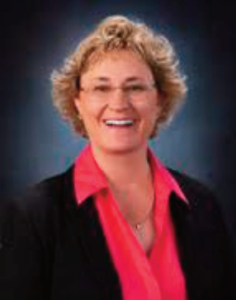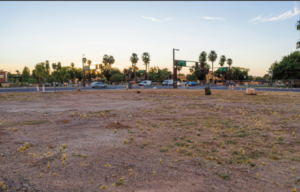 Commentary by Jennifer Adams
Commentary by Jennifer Adams
Tempe has a long history of leaning forward into challenges. Our community is built on doing what some might think is impossible, like building a lake out of an empty riverbed. Innovation is part of our past, present and future.
For two years, we have been working with Arizona State University to detect opioids in wastewater to help us combat addiction.
When COVID-19 became a pandemic, we evolved that partnership. With ASU professor Rolf Halden and his team of scientists, we are tracking the presence of SARS CoV-2, the virus that causes COVID-19, in city wastewater.
More than 400 cities around the world get data about their wastewater from ASU.
However, Tempe is the first city that aims to combine wastewater data with other strategies to drive decisions about community health. We have created a website and dashboard to explain the project.
It is best viewed using Chrome at https.//covid19.gov.
When you look at the dashboard, you will see the data presented as weekly averages of the coronavirus “signal” that researchers are picking up from sewage flowing through underground pipes. What equates to a strong or weak virus signal is still being determined. Samples are collected from five areas of Tempe and they cannot be traced back to any specific person, home or business.
While the science behind this project is certainly complicated, let me tell you what is easy to see and absorb: the incredible collaboration among city departments to make this happen.
We have all heard the widespread belief that government at all levels works in silos, right?
Well, I am happy to say that this research is an example of the exact opposite – the leaders and employees within three city departments have done amazing work together.
Tempe Fire Medical Rescue Chief Greg Ruiz, Strategic Management and Diversity Director Rosa Inchausti, and Municipal Utilities Director Terry Piekarz deserve to be commended for their openness to collaborate in new ways for the benefit of our community.
We know that not everyone has been tested for coronavirus, so the collection of this data could offer a more comprehensive, real time assessment of the presence of coronavirus in our community.
Questions about the wastewater data analytics program may be directed to Rosa Inchausti, 480-350-8999, or email rosa.inchausti@tempe.gov.
As we work to reopen more city facilities to the public, this kind of promising data could help us make choices in the future.
Many facilities and services will reopen June 15, with others reopening later in the summer.
It will be valuable to consider this wastewater data, along with the CDC’s criteria, and state and regional coronavirus guidance, for informing our reopening decisions.
Tempe will continue to work with businesses, scientists, residents and staff to find new ways to build an even better Tempe. Do you have ideas to make Tempe a better place? I would love to hear them. Connect with me by calling 480-350-8835, following me on my City Council Facebook account (JenniferAdamsTempe) or emailing me at Jennifer.adams@tempe.gov.
Tempe resident and council member Jennifer Adams voted in favor of the settlement and use permit.
“I wasn’t in agreement with it because the neighborhood didn’t want it. And what the neighborhood desires or wishes for—that matters to me,” Adams said.
“Any time I can take the neighbors’ side, I will. That’s been one of my top priorities since I’ve been on council.”

South Tempe Realtor Nick Bastian lives near the site and weighed in on the project.
He acknowledged many residents’ desire for a type of amenity on the site but pointed to private property rights as a concern.
“This is one of those ones where it’s a little weird for me because I stand firmly in the middle,” he said. “I think a lot of people would like something really cool or high end—maybe a wine or sushi place.
“I also really feel like the private-property-rights issue has to be looked at really carefully. When we start picking winners and losers just based on what the community thinks should go there, versus what an owner of a property is legally able to do, I think it becomes kind of a slippery slope.”
Several years ago, the city of Tempe developed eight-character areas, South Tempe among them. The character areas were designed to be one way the city conveys the vision and goal of each area.
City planners refer to the character areas when working with businesses and developers. That said, the character areas are guidelines—but not law.
The city’s website, tempe.gov/, refers to the designated areas but cautions that although “we care about what you want… we cannot violate the law or take away someone’s private property rights.”
Matt Smith and his family live within walking distance of the future home of Valvoline.
“Like a lot of South Tempe residents, we hoped for something that would build community, maybe a fun café or a restaurant, and Valvoline does none of that,” Smith said.
In spite of the city council’s vote in favor of the settlement and use permit, he remains optimistic.
“I don’t think the city of Tempe has ever been held so accountable to the character areas plan. People showed up in force and they represented their community, and every step along the way, it’s as if our voice got louder and louder.
“I’m very proud of that.”
Ron Tapscott, who also lives near the empty lot, said he wasn’t surprised by the council’s vote.
“The city of Tempe has a very long history of folding under pressure when lawsuits are threatened,” Tapscott said.
In his opinion, there are two types of developers: those who are “very sensitive to neighborhood concerns and wishes and are involved in working with neighborhoods to alter their projects to be more in align with the sentiment of the community,” and those that aren’t.
“They didn’t really want input from the neighborhood. They came in with a particular idea of what they wanted developed on that corner and then pursued it through the process,” Tapscott said.
Now that the owners have secured a use permit for a Valvoline, they must seek a building permit.
What, if anything, can residents do? Not much, it turns out.
“What I was hoping for was to keep working with the property owners to come up with a compromise between the neighborhood and developer,” Adams said.
“In Arizona, the property owners have a lot of rights. We were swimming against the stream on this one.”
The email from the city of Tempe prior to the council meeting noted that both members of the Development Review Commission as well as city councilmembers “heard your concerns about the development and tried to fulfill the wishes of the area community by denying a use permit for the project.”
The lawsuit filed by the property owners changed all that.
Still, “property enhancements that had been recommended by staff that Valvoline had originally declined to incorporate into the project, such as setback service bays and improved paving near walkways, were agreed to,” the email goes on to say.
The city will not pay out any money as a result of the settlement.

